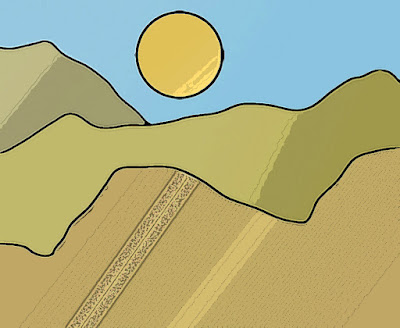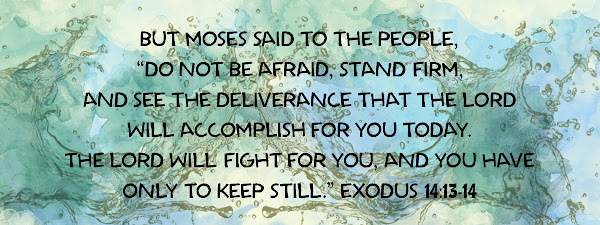Exodus 17:1-7
1 From the wilderness of Sin the whole congregation of the Israelites journeyed by stages, as the Lord commanded. They camped at Rephidim, but there was no water for the people to drink. 2 The people quarreled with Moses, and said, "Give us water to drink." Moses said to them, "Why do you quarrel with me? Why do you test the Lord?" 3 But the people thirsted there for water; and the people complained against Moses and said, "Why did you bring us out of Egypt, to kill us and our children and livestock with thirst?" 4 So Moses cried out to the Lord, "What shall I do with this people? They are almost ready to stone me."
5 The Lord said to Moses, "Go on ahead of the people, and take some of the elders of Israel with you; take in your hand the staff with which you struck the Nile, and go. 6 I will be standing there in front of you on the rock at Horeb. Strike the rock, and water will come out of it, so that the people may drink."
Moses did so, in the sight of the elders of Israel. 7 He called the place Massah and Meribah, because the Israelites quarreled and tested the Lord, saying, "Is the Lord among us or not?"
will come out of it, so that
the people may drink.
Exodus 17:6
Journeys in Stages
Today's reading is from fairly early days in Israel's extensive wilderness narratives that detail Israel's departure from Egypt, through their sojourn at Sinai where they received the gift of the Ten Words/ Ten Commandments, and on through their arrival at the edge of the Jordan River that marked the border of the Promised Land.
I blogged this Exodus passage as recently as Lent 3 in March 2023, but why not again? The lectionary scheduled it for this weekend; deserts are one of my favorite topics and the exodus one of my favorite scriptural events.
17:1 The Israelites journeyed by stages…
The "journeyed by stages" tradition says it took about forty years after leaving Egypt to reach the Jordan River and cross into Canaan. It may have been a few years more or less, but forty equals two generations—long enough for people to start forgetting and stop longing for their former lives, long enough to learn to trust God's daily provision.
Water / Moses' Staff
Today's Water from the Rock segment comes from a water-related series:
• they leave the Sea of Reeds (sometimes called "Red Sea") and travel through the wilderness of Shur – Exodus 15:22…
• and arrive at Marah, where God asks Moses to sweeten the bitter waters with a piece of wood – Exodus 15:23-26
• from Marah they go to Elim, where they find twelve springs of water – Exodus 15:27
• from Elim it's onto the wilderness of Sin, where God first provides manna – Exodus 16:1-36 (only for reference; the text doesn't mention water)
• from Sin to Rephidim, the setting for today's experience of water from a rock.
When Moses threw wood into the bitter water at Marah, it became sweet. When Moses struck the rock at Rephidim with his staff, water poured out. Moses' obedience helped awaken resources already there.
And from a series that features Moses' staff:
• Exodus 4:1-5; Exodus 7:8-10 – God turns Moses' shepherd's staff into a snake to convince the people God had heard their cries of pain and would redeem them.
• Exodus 7:17-21 – Moses' staff turns the Nile River into a stream of blood.
• Exodus 14:16 – "Raise your staff and stretch out your hand over the sea to divide the water so that the Israelites can go through the sea on dry ground." Moses' staff becomes an icon of deliverance.
• Exodus 17:5-6 God tells Moses to take his staff and "strike the rock" at Horeb with his staff he used to strike the Nile.
Event, Incident, Occasion Titles…
…Branding?
Exodus 17:7 Massah means testing; Meribah is quarreling or striving. Moses gave a name or title to this event so the people wouldn't forget their earlier distrust, and also remember God's grace-filled response:
As you reflect on your own, your family's, your congregation's, maybe your city or town's life stages, would it help you to name some of them? If you scrapbook or journal, you may have done some titling.
Sukkot
This year for the week from Friday 29 September through Friday 06 October Succoth/Sukkot, also known as the Festival of Booths or Feast of Tabernacles commemorates God's presence and protection during Israel's forty years in the exodus desert. As a Festival of Double Thanksgiving, it also offers gratitude for the autumn harvest. You can find it in Exodus 23:16, "You shall observe the Festival of Harvest, of the first fruits of your labor, of what you sow in the field. You shall observe the Festival of Ingathering at the end of the year, when you gather in from the field the fruit of your labor;" and in Leviticus 23:33-43.
and thy lovingkindnesses;
for they have been ever of old.
Psalm 25:6









